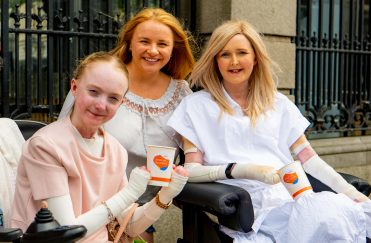Debra Ireland calls for investment in people with epidermolysis bullosa (EB) in Budget 24
September 20 2023

For the second year in a row, DFI member organisation Debra Ireland are urging the Government to give the cost of two coffees a day to protect those living with epidermolysis bullosa, a rare and incurable condition that makes skin as fragile as a butterfly wing.
Read more from Debra Ireland:
We are asking for just €810,000 to be ring-fenced in Budget 2024 to support the estimated 300 people living with extremely painful epidermolysis bullosa (EB) in Ireland.
Our ‘Small ask, big impact’ Pre-Budget Submission outlines four key requests –including a care co-ordinator within the HSE to link Ireland’s entire EB community to supports.
EB or ‘Butterfly skin’, is caused by the absence of proteins which bind the skin together, creating excruciating blistering at the mildest touch or movement – in severe cases requiring bandaging every 24 hours.
“Bearing in mind the lifelong pain, physical and mental trauma that people go through with EB, what we are looking for is a tiny fraction of the current €23billion health budget,” said Joanna Joyce, Head of Advocacy with Debra.
“In fact, when calculated, the €810,000 ask registers as 0.003% of that total.
“In many cases, EB is an invisible condition which has a hugely negative impact on people’s lives, yet those living with it are still struggling to access vital supports and services.
“A big gap that we see is the lack of a central point of contact in the community for a family to liaise with, so that they can be signposted to help and supports.”
In addition to the care co-ordinator costing €75,000, the €810,000 investment is also desperately needed to fund:
* a clinical psychologist supporting adults, allowing them to access specialist mental health assistance (€80,000);
* a ring-fenced fund for home nursing care to look after people living with the most severe forms of EB, who require frequent bandage changes, allowing them to access flexible care packages (€580,000);
* an EB outreach nurse based in St James’ Hospital, Dublin, supporting adults and providing an essential link between hospital and community and supporting infection assessment at home (€75,000).
The funding would support those with the four main types of EB – simplex, junctional, dystrophic and kindler.
Dubliner Aoife Murdock, 42, who lives with EB simplex, told how the condition leaves her “wrecked” when she has a big flare up.
“It’s really, really draining on your system as a whole,” she said.
“It just makes everything so much harder. It’s an unseen illness. There are times you would love help, but you can’t get it and don’t feel you can ask for it.”
Laois woman Emma Fogarty, who lives with recessive dystrophic EB, said: “Up to the age of 28 my mom was doing my dressings. That’s not OK, that’s not good enough.
“There were days when I was screaming in pain, and she felt she was causing it. She wasn’t causing the pain; EB was.”
Based on the estimated 300 people living with EB in Ireland, the investment we are seeking would cost the Government €7.40 per person a day or two cups of coffee.
We are also asking families and supporters to retweet and tag Minister for Health Stephen Donnelly in a bid to secure a meeting to outline the importance of the pre-Budget requests.
For more see News - Debra Ireland.
ENDS